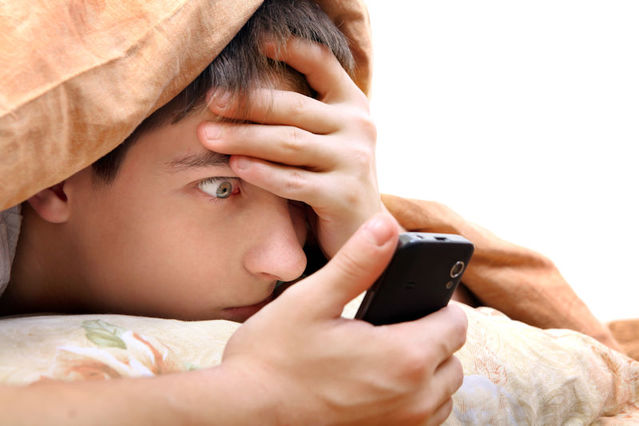Adolescence
Is Your Teen Vamping Instead of Sleeping?
The effects of late-night cellphone use on adolescent health.
Posted April 25, 2018

The argument for setting strict rules on cell phone usage after a teen’s bedtime just got stronger. It is becoming increasingly clear that late-night phone use, often called vamping, not only interferes with young people’s sleep patterns, it also threatens their mental health.
The latest study in a growing body of research on vamping should send a big warning signal to parents of middle and high schools students. Conducted at Murdoch University in Perth, Australia, this was the first long-term study that examined how night phone use and mental health were connected.
The longitudinal study of 1,101 thirteen to sixteen-year-olds over four years of high school linked late-night texting and phone use to depressed moods, lower self-esteem, and reduced coping abilities. These symptoms go hand-in-hand with lower academic performance.
Lynette Vernon, the lead researcher, reports that the numbers of teens who text and use their phones during sleeping hours is growing each year. This acceleration in night-time cellphone use is clearly connected to the growing lack of sleep experienced by today’s teens. Now, it is also linked to a decline in their well-being.
The New York Times article, Social Media’s Vampires: They Text by Night, reports common adolescent stories of snuggling under the covers with a dimly-lit screen. There are many choices of activities, from texting friends to downloading music. Parents are stressed when they check on their kids a few hours after bedtime only to find them still awake with their phones. Teens are stressed too, because they feel emotionally unable to unplug after dark.
Elizabeth Englander, Professor of Psychology at Bridgewater State University in Massachusetts, conducted a 2014 study on teen vamping. In a survey of 642 college freshmen, she discovered that a surprising 80% of both males and females admitted to being frequent vampers during high school. Those students spent an average of 1-2 hours engaged with their mobile phones when their parents thought they were asleep.
In Englander’s study, 42% of frequent vampers reported struggling with depression, compared with 25% of all children. The recent longitudinal study in Australia provides additional insights, suggesting a cause and effect link between vamping and depressed moods.
Not only do mobile devices deter adolescents from the sleep they desperately need, devices make them feel less sleepy and affect the quality of the sleep they do get. A study conducted by Charles Czeisler in Nature explains how the artificial blue light emitted from electronic devices activates arousing neurons in the brain. This arousal disrupts the body’s ability to produce melatonin, a sleep-inducing hormone.
The blue light argument alone is enough to make the case for keeping cell phones out of the bedrooms of teenagers, a time critical to their cognitive, social, and emotional development. When combined with the growing research linking late-night device usage with depressed moods, lower self-esteem, reduced coping abilities, and the potential for lower performance, it becomes essential for parents to take note—and action.
Parents Can Set Healthy Nighttime Boundaries
One of the important developmental tasks for teenagers is to become increasingly responsible for their own behaviors. Yet this kind of development doesn’t happen without parent support. The research is clear. When parents establish healthy sleep routines and control the use of media before and during bedtime, children have healthier outcomes.
Setting boundaries and teaching children about the value of sleep and healthy media use is no different from scaffolding them in other areas of development. Parents set guidelines and rules for behavior and relax those rules as children are able and willing to act responsibly on their own.
At whatever age children get their first mobile device, parents should establish clear usage rules, especially for night-time. Just because smart phones have built-in alarms isn’t a good argument for using them as such. If your adolescent needs an alarm clock, get them one.
References
Czeisler, C. A. (2013). Perspective: Casting light on sleep deficiency. Nature, 497, S13. doi:10.1038/497S13a
Vernon, L., Modecki, K. L. and Barber, B. L. (2018), Mobile Phones in the Bedroom: Trajectories of Sleep Habits and Subsequent Adolescent Psychosocial Development. Child Dev, 89: 66-77. doi:10.1111/cdev.12836


